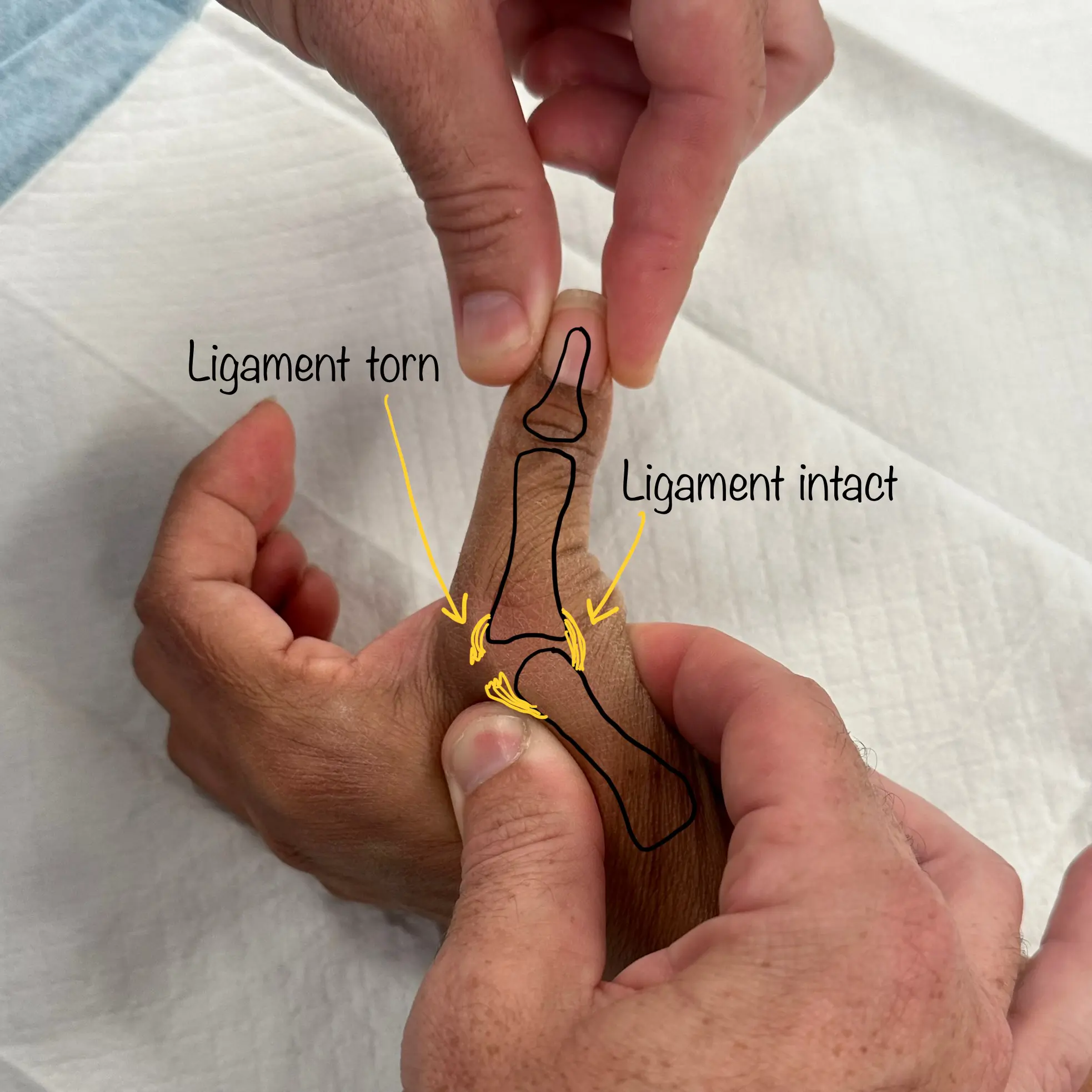Thumb UCL Injuries (Skier's Thumb)
Thumb UCL (ulnar collateral ligament) injuries, commonly referred to as Skier’s Thumb or Gamekeeper’s Thumb, occur when the ligament at the base of the thumb is stretched, partially torn, or completely ruptured. This ligament is crucial for thumb stability during gripping and pinching. Damage to the UCL can significantly affect hand function and, if untreated, may lead to chronic pain or instability.
While this injury is frequently associated with skiing accidents, it can also result from falls, sporting impacts, or repetitive stress to the thumb joint. Early diagnosis and treatment are essential for optimal recovery.

Frequently Asked Questions
A thumb UCL injury is damage to the ulnar collateral ligament located at the base of the thumb. This ligament stabilises the joint during pinching and gripping. Injuries can range from mild sprains to complete tears, sometimes called Skier’s Thumb or Gamekeeper’s Thumb.
Common Causes of Pathology
Thumb UCL injuries can be caused by various factors, including:
- Acute trauma: A sudden force, such as a fall onto an outstretched hand or a direct blow to the thumb, can overstretch or tear the ligament.
- Sports-related incidents: Activities like skiing, snowboarding, football, or other contact sports often involve gripping objects or bracing during falls, placing high stress on the UCL.
- Repetitive strain: Certain occupations or hobbies that require repetitive pinching or gripping can gradually weaken the ligament over time.
Symptoms to Watch For
The symptoms of thumb UCL injuries may include:
-
Pain at the base of the thumb – especially when gripping, pinching, or moving the thumb sideways.
-
Swelling and bruising – localised inflammation and discolouration may develop soon after injury.
-
Thumb instability – a loose or unstable feeling in the joint, making it difficult to hold objects securely.
-
Reduced range of motion – difficulty bending or straightening the thumb fully, impacting daily activities.
Types of injury
Thumb UCL injuries can vary in severity, and they can be classified into different types:
Thumb UCL (ulnar collateral ligament) injuries vary in severity. Identifying the type helps determine the best treatment approach:
1. Sprain (Partial UCL Tear)
The ligament is overstretched or partially torn, but some fibres remain intact. This usually causes pain, swelling, and mild weakness without completely destabilising the joint. Most cases heal with non-surgical treatments like splinting and physiotherapy.
2. Complete UCL Tear
A full rupture of the ligament, resulting in significant thumb instability. This makes gripping, pinching, or holding objects difficult. Surgical repair is often recommended, especially for active individuals or those whose work demands strong hand function.

3. Complete Tear with Stener Lesion
The most severe form, where the torn ligament is displaced and trapped above the adductor aponeurosis (a nearby tendon covering). This prevents healing and requires surgery. If untreated, it can cause long-term instability, weakness, and arthritis.
Treatment options
Non-operative treatment
Mild or partial UCL injuries can often be managed without surgery, especially if joint stability is maintained. Treatment may include:
-
Immobilisation: A thumb splint or cast to protect the joint and allow healing.
-
Ice and anti-inflammatory medication: To reduce swelling and discomfort.
-
Rehabilitation: Guided exercises to restore movement, strength, and stability after the initial healing phase.

Operative treatment
Surgery is often recommended for complete tears, Stener lesions, or cases where conservative care has failed. Options include:
-
UCL repair: Reattaching the ligament to its anatomical position using sutures or anchors.
-
UCL reconstruction: Using a tendon graft to restore ligament function when original tissue quality is poor.
-
Post-operative rehabilitation: Structured physiotherapy to ensure optimal recovery, strength, and range of motion.
Frequently Asked Questions
The internal brace technique augments the standard UCL repair by using a high-strength suture tape (or similar material) that is fixed with anchors over the repaired ligament. It doesn’t replace the ligament itself but acts like a safety reinforcement during healing.
- Allows earlier controlled motion (sometimes days after surgery) rather than waiting several weeks.
- Helps reduce stiffness and muscle atrophy that often come from prolonged immobilization.
- Often leads to faster return to sports or heavy use in athletes, in some cases returning in about 5-6 weeks versus 10-12 weeks with traditional methods.
Why Choose Dr Oscar Brumby-Rendell for treating your Thumb ULC injury?
As a fellowship-trained orthopaedic surgeon, Dr Oscar Brumby-Rendell provides expert diagnosis and treatment for thumb UCL (ulnar collateral ligament) injuries, including Skier’s Thumb and Gamekeeper’s Thumb. He delivers individualised care plans that combine the latest surgical and non-surgical techniques with a compassionate, patient-centred approach.
Patients across Adelaide and surrounding regions choose Dr Brumby-Rendell for:
-
Accurate assessment and clear explanation of your thumb ligament injury
-
Evidence-based, minimally invasive surgical options where appropriate, helping reduce recovery time
-
Proven success rates with a personalised rehabilitation plan for optimal function and long-term stability

Ready to learn more?
Learn more about Hand and Wrist-related injuries with Dr Oscar Brumby-Rendell by watching our videos below.
Read more articles about hand-related injuries here:
Once you have a referral…
Book your consultation here.
